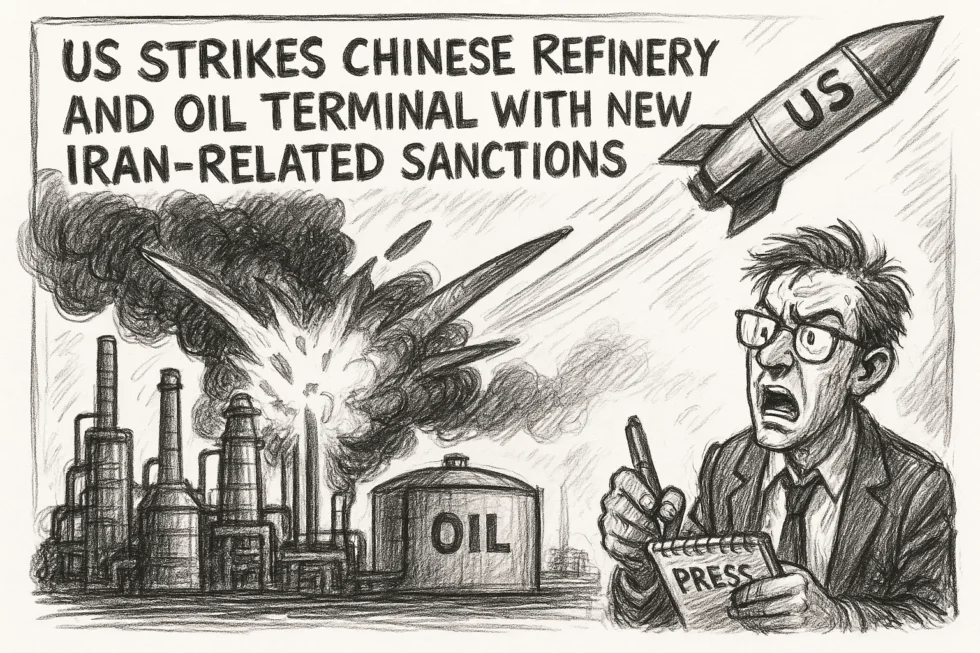US sanctions hit China’s refinery and oil terminal — Beijing calls move “illegal and unilateral”

The United States has imposed sweeping sanctions on a Chinese independent refinery and crude oil terminal, accusing them of importing millions of barrels of Iranian oil in violation of global restrictions. The decision was announced by the US Department of the Treasury and reported by G.Business, citing official US and Global Times statements.The Treasury confirmed that around 100 individuals, companies and vessels have been added to the sanctions list for facilitating Iran’s oil and petrochemical exports.
“These entities collectively enabled the export of billions of dollars’ worth of oil and petroleum products, providing critical income to the Iranian regime and its support for terrorist groups,” the statement said.
Among the newly blacklisted entities are Shandong Jincheng Petrochemical Group, a private refinery in Shandong province, and Rizhao Shihua Crude Oil Terminal, located in the Lanshan port district. Both have allegedly handled Iranian oil disguised as “Malaysian” or “Omani” blends to conceal its origin, according to shipping data reviewed by Reuters.
Beijing’s sharp response
China’s Foreign Ministry condemned the US decision, calling it “illegal and unilateral.”
Spokesperson Guo Jiakun said the measures have “no basis in international law and are not authorised by the UN Security Council.”
“China firmly opposes illegal unilateral sanctions. We urge the United States to stop weaponising economic pressure and respect the legitimate rights of all countries to conduct normal trade,” Guo said at a press briefing, quoted by Global Times. Beijing reiterated that its energy cooperation with Iran is “legitimate and reasonable.” Analysts point out that China remains the largest buyer of Iranian crude, despite Western sanctions and diplomatic pressure.
Fourth wave of sanctions this year
According to Reuters and official US Treasury data, this is already the fourth round of sanctions in 2025 targeting Chinese-linked entities involved in the Iranian oil trade. Earlier rounds focused on shadow-fleet tankers and financial intermediaries in Hong Kong, the UAE and Turkey, accused of helping Tehran circumvent international restrictions.
The Global Times, China’s state-run newspaper, accused Washington of “weaponising economic pressure” and warned that such measures risk destabilising global energy markets while strengthening Asian energy alliances.
The episode illustrates a widening geopolitical fault line between Western sanctions policy and Asia’s pursuit of energy autonomy, signalling a gradual shift in the balance of power across global oil and currency flows.
Impact and outlook
Analysts warn that the latest sanctions could further deepen rifts between Washington and Beijing, already inflamed by trade disputes, semiconductor export controls and South China Sea tensions.
The decision underscores Washington’s determination to tighten enforcement of Iran-related sanctions, even at the risk of antagonising major Asian importers.
China, meanwhile, is expected to intensify diplomatic and energy cooperation with Tehran and Moscow, leveraging platforms such as the Shanghai Cooperation Organisation (SCO) and the BRICS Energy Forum. These channels enable Beijing to promote non-dollar energy settlements and build trade networks less vulnerable to Western pressure.
According to Vortexa, Iranian crude shipments to China averaged 1.2 million barrels per day in mid-2025, often relabelled under alternative origins. The sanctions may disrupt these flows temporarily but are unlikely to halt them entirely, given China’s state-controlled refineries and large strategic reserves.
In the longer term, the confrontation reveals a shifting energy order: the United States continues to wield financial dominance as a geopolitical instrument, while China constructs parallel systems designed to withstand Western sanctions and sustain its energy independence.
Stay connected for news that works — timely, factual, and free from opinion. Learn more about this topic and related developments here: Nobel Peace Prize 2025: Who received the world’s most prestigious award this year